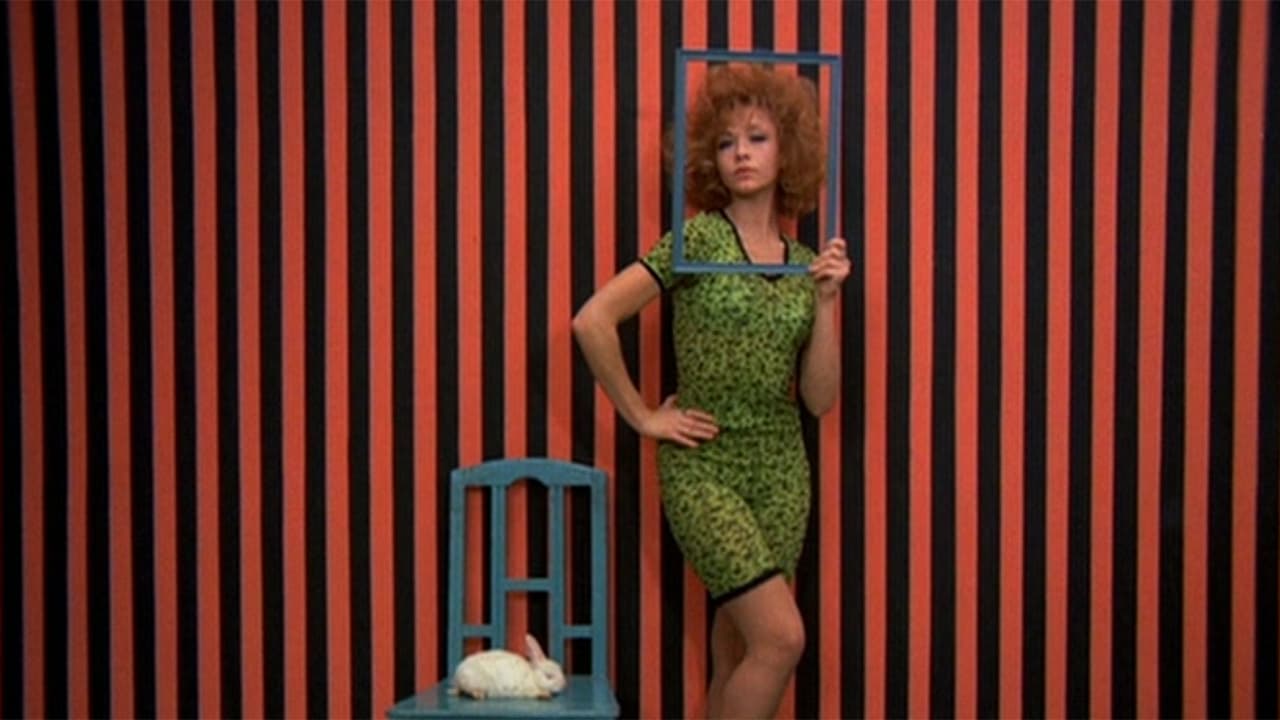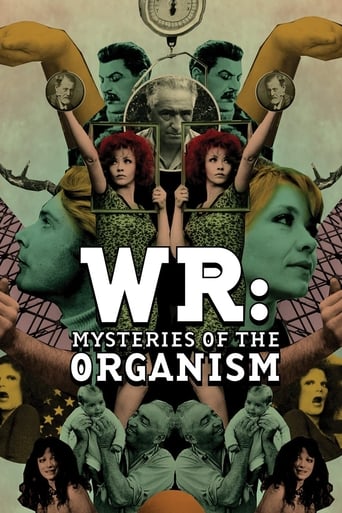



Strong and Moving!
I wanted to like it more than I actually did... But much of the humor totally escaped me and I walked out only mildly impressed.
View MoreThis film is so real. It treats its characters with so much care and sensitivity.
View MoreIt is interesting even when nothing much happens, which is for most of its 3-hour running time. Read full review
View MoreReleased in 1972 overseas and deeply rooted within art-house cinemas, "WR" is not a film for mass audiences, though; one could argue that it carries more honest truths today than it did when originally conceived. Watching it today, in 2008, nearly thirty-six years later, it is difficult to watch. Not that there is anything wrong with this cult masterpiece, it is a film that is not as "modern" with its voice as it is with its message. As I do believe that this is an important film to watch, it may not initially show itself to you right away. Like myself, it took nearly two viewings to fully understand the scope of "WR: Mysteries of the Organism" nearly the same viewings that it took when originally watching "8 ½" or even "Obscure Object of Desire" it isn't a film for just afternoon viewing prepare yourself for cinematic intelligence on a grand scale. This film forces you to think, look within the images, to break outside of your mold, and forces yourself out comfort zone. This is "WR: Mysteries of the Organism", who would want anything else.How deep does psychology have to go? As the film asks this question, it feverously jumps from an American visual to a Yugoslavia political. We go from our Reich-ian feminist who is in love with the ice-skater, to the simple stroll of our Warhol performer in New York, than haphazardly back to the demonstration in Yugoslavia. As our sexual moments continue throughout, Makavejev uses them wisely (and symbolically) to make political and individual statements. It is this juxtaposition that makes this film bold and expressive; growing into more than just your average "I am Curious" moment. As any of our scenes nearly climax (literally and figuratively), Makavejev takes the moment to pull us back into the "why" of the scene. It isn't American cinema, in which skin is used to fill theater seats, there is a point to the sex, and just as we think there is no rhyme to the reason, we are pulled back into Makavejev's flamboyant mind. In essence, he is answering the age old question, "do sex and politics really mesh"? Then, seemingly out of nowhere, he pulls away the carpet giving us more than the original tantalizing scenes, but replacing them with horror and grotesque again with a point. To stress again why "Mysteries of the Organism" demands more than one viewing (nearly right after the initial viewing) is because it isn't just your average entertainment only film, Makavejev has put himself within the feature giving us a short glimpse of personal ideals, sexual exploits, and the power of politics all within only about 85 minutes. It is enough to give anyone a headache, but also excitement for what was missed.Orgon Therapy? Madness or Sane formulations? "WR" questions Reich's ideals through faux-cinema and a sense of documentary styles. While some of the history is shown through factual images, i.e. Stalin as a symbol of sex, it is the directed images that really add the value to "Mysteries of the Organism". The drama of the characters that are represented demonstrate real life the choices made and the consequences that follow. It is more than just a handful of powerful scenes it is the option for viewers to discuss, have opinions, and agree/disagree. As I throw out these random thoughts of this film, it only seems to fit that of our director. This is not a linear film, but consistent imagery posted with symbolism. Listening to the audio commentary, it seems to add the glue to these random tangents. Criterion's addition of Richard Durgnat's words (read by Daniel Stewart), help the free-associated viewer deal with the deeper changes and movements within the film. Overall, Criterion's addition of this film to its collection continues to show their excitement towards groundbreaking cinema, nearly forgotten through the modern CGI-explosive cinema bombarded today, "WR: Mysteries of the Organism" is difficult to watch, nearly too smart for my initial view it is challenging because of the bold words, the wild symbolism, and that wild scene that uses the song "Kill for Peace". Whew, perhaps this paragraph was random thoughts, but it seems to work with this feature.Overall, in hopes not to bore the average reader, "WR: Mysteries of the Organism" is part black comedy, documentary, political collage, philosophical essay, and a bit of science fiction. While these words hardly scratch the surface of what "WR" has to offer, this film is bizarre in a phenomenal way. This isn't your average art-house picture, but instead a film that demands debate and pulls you within the film pushing your mind, focusing your eyes, and challenging your intelligence. Using political scenes that are dated, Criterion's release gives you the opportunity to explore from different angles, so that you can see the universal language that "WR" uses. This is a challenging film. It seems to be pulling from every genre, in a way that is difficult to explain. The final scene of this film still remains in my mind, the stern Stalin image that leads us into a darker world. I still don't think I fully understand what Makavejev was trying to say, but what astonished me about this film is that I didn't want to just put it aside. "WR" pulls you, it yanks at your heartstrings, it opens your eyes, and one viewing is never enough for such a subtle (or is it?) engrossing film. While it would not be for everyone, it still remains relevant today, and I am excited that Criterion has chosen to add it to their collection. "Mysteries of the Organism" is an excellent film for those angered by the idiosyncratic destinies of Hollywood.Grade: **** ½ out of *****
View MoreThe film for which director Dusan Makavejev is best known. It's similar to his later Sweet Movie, which I watched last week, in that it's made up of a bunch of disparate parts edited together. The most prominent thread is a documentary about sexual psychiatrist and (pseudo-)scientist Wilhelm Reich, a refugee from Nazi Germany who fled to the United States, where he was ironically persecuted and imprisoned when the government became suspicious of his work. A second thread is fictional, set in Eastern Europe, and is about a sexually liberated woman (Milena Dravic) promoting sexual freedom in Communistic language. There are other smaller threads about Andy Warhol's transsexual protégé Jackie Curtis, a hippie with a gun who runs around New York City, a woman who makes dildos and probably a couple of other ones I'm not remembering. The film covers some interesting areas, but it's too loose and not interested enough in any of these things to engage in them. The separate bits began to fall apart, for me at least. Sweet Movie was kind of a mess, but it was a well-structured masterpiece in comparison to WR. I liked Sweet Movie a whole lot more.
View MoreThis takes the form of seemingly everything from 1965 to 1975. It's a hippy-dippy, uncritical, anti-establishment goof on the work of Wilhelm Reich, with agit-prop sub-plot for good measure. 'What's New Pussycat?' meets 'Theremin.'Wilhelm Reich's tenuously connected work and pseudo-scientific gadgets (WTF does the accumulator do? How do orgasms change cloudscapes?) are more like something a flakey "inventor" would make than a serious analyst. Just because a previously intelligent person suddenly declares a correspondence between any two things (war and chocolate cake, or... orgasms and Marxist Utopia) doesn't make it so. Just because a quack found some drama queens to indulge him doesn't mean the work was valid. His ideas are as odd and harmless as his punishment was draconian overkill. Another testament to the usual misuse of government to keep Joe Average feeling unthreatened, regardless of how oversensitive Joe's threat mechanism is. Reich (to me) had firmly lost the path of knowledge, but he didn't seem to be harming anyone. No one involved (Reich, his patients, the authorities) apparently knew much about moderation. Thank God that period is over and we've said goodbye to both Orgonon and the Police State.The movie is amateurishly edited together with a side-narrative; a frigid wretch intones about sexual freedom, but can't actually make her way to a sexual event (with an ice skater) to save her life. Much better to talk and talk and talk about the state and it's repression of the perfect workers collective via sexual shame. Good times! This movie left me thinking that rank-and-file demagoguery (the preference of the individual to address society than another person) and the national urge to ramble on ad nauseum about half-understood political ideas, would have to be defeated before the Soviet chokehold could successfully be removed from the population. This half offers a few laughs but it fails to build.It's not easy to watch due to weirdness and annoyance, but at least this movie engages provocative ideas, something most movies flee from. I left early, having got the (very repetitive) point.
View MoreWR:Mysteries Of The Organism is a film that I first heard about some years ago, when I was perusing some foreign films in a college town video outlet in Northhampton,Mass. The description sounded interesting & weird enough to potentially warrant a rental. Unfortunately, as I lived more than an hour away from this video shop, a rental was out of the question, so I would have to contend with a hope that it would turn up as a revival in one of our local art houses (in a badly scratched & choppy print,which is sometime the norm for older films that have been out of circulation for years). Big surprise:a brand spanking new print of Dusan Makavejev's weirded out classic is now available for public (or would the word pubic be more apropos?)viewing. The film starts out as a (kind of)documentary of Wilhelm Reich's studies of orgones & the effects it has on humans. It also tackles the subject of repressed orgasms & just how dangerous they are. The film then kind of branches out to a series of unrelated episodes, including Eastern bloc Communism, interviews with Warhol superstar Jackie Curtis,some kind of psychological test subject film footage (presumably Reich's subjects,filmed in the 1940's or 1950's before his death in 1957),rare German porn films,and other weirdness. This film will not be everybody's cup of tea (or perhaps vodka), but is still worth a look to check out a period piece from 1971 (although some of it was filmed as early as 1968) that probably wouldn't get much exposure,otherwise. No MPAA rating here (as it's a re-release print), but bear in mind that originally received the dreaded "X" back in the day for rampant sexuality & nudity...in short,leave the kiddies home.
View More